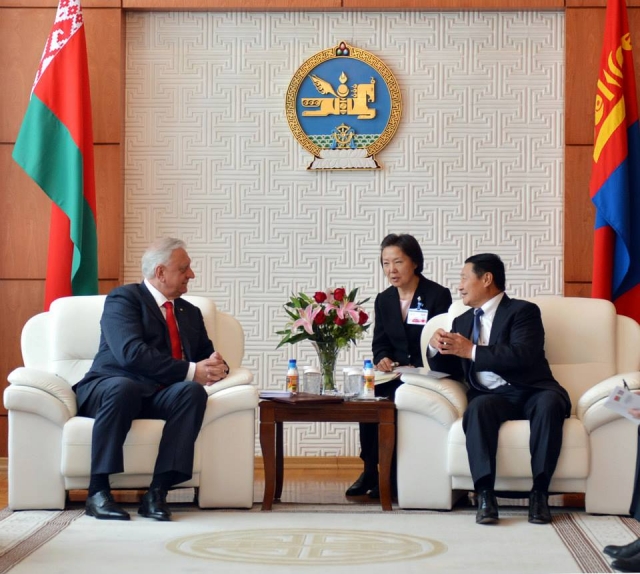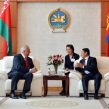
Mongolian-Belarusian Relations Reach New Levels of Cooperation After Myasnikovich’s Visit
Publication: Eurasia Daily Monitor Volume: 10 Issue: 162
By:

The prime minister of the Republic of Belarus, Mikhail Myasnikovich, led a large delegation September 3–5, on the first state visit to Mongolia since the establishment of bilateral diplomatic relations in 1992. The Mongolian government treated the visit as high level, and media coverage was extensive and prominent. The first day of the visit consisted of bilateral talks between the two governments, including meetings with Mongolian President Tsakhia Elbegdorj and Prime Minister Norovyn Altankhuyag. Both sides signed an intergovernmental agreement to waive visa requirements for stays up to 90 days (Mongolia now has such agreements with 16 countries) (infomongolia.com, September 5) and to cooperate in education, military, customs and technical sectors (infomongolia.com, September 4). The atmospherics of this visit sharply contrasted with the visit of Russian Deputy Foreign Minister Igor Morgulov to Mongolia on August 29–31. Morgulov’s meetings with Mongolian Deputy Prime Minister Dendev Terbishdagva and Foreign Minister Lu Bold, were rather downbeat—with both sides emphasizing the need to boost their sluggish economic cooperation (The Mongol Messenger, September 6).
During his meeting with Myasnikovich, President Elbegdorj underlined that the visit opened a new chapter in the history of Belarusian-Mongolian bilateral relations. Myasnikovich indicated his delegation would discuss projects on collaborating in assembling heavy mining machines such as Belaz (for the copper project in Erdenet) in Mongolia, establishing repair factories, and cooperating in the financial sector. Noting that many Mongolians were educated in Belarus before the 1990s, the president underlined the importance of resuming cooperation in training professionals and other efforts to improve Mongolia’s economic competitiveness. The two discussed the problems of landlocked countries and transit transportation (The Mongol Messenger, September 6).
Prime Minister Altankhuyag welcomed his Belarusian counterpart on the capital’s main square with an honor guard and the playing of national anthems in front of many Mongolian Cabinet officials. During the first day’s discussions, the two heads of government agreed to establish joint ventures in mining, agriculture and food processing, to widen ties among Mongolian and Belarusian universities, and to expand trade in mining and agricultural products such as wool and cashmere. Myasnikovich noted that he had brought a large, diverse delegation because Belarus ascribes “high significance to this visit” (infomongolia.com, September 4.)
On September 4, upon meeting with Mongolia’s Parliamentary Speaker Zandaakhuu Enkhbold, Myasnikovich promised to “share [Belarus’s] experiences” in the fields of mining, extraction machines and techniques, as well as road construction and public transportation. He offered to supply tractors, agricultural facilities and transport vehicles, such as buses and electric trains, to cooperate in the oil production sector, to train Mongolian students in Belarus, and to collaborate in creating a general network of mining technical service. The two also discussed establishing joint ventures for dairy products, baby nutrition and poultry production, and signed a joint statement on cooperation (The Mongol Messenger, September 6).
Progress particularly was made on defense cooperation. Deputy Minister of Defense Avirmed Battur signed an inter-governmental agreement on “Military-Technical Cooperation” with the first deputy chairman of Belarus’ State Military Industrial Committee, Major General Vladimir Sulimov. The agreement emphasized cooperation to upgrade and modernize the quality of Mongolian armaments, which still are predominantly obtained from Russia, and “broaden and develop foreign cooperation of the Mongolian defense sector with countries that manufacture and technology that have similar models and standards” (infomongolia.com, September 5)—part of Mongolia’s general plan to increase military-technical cooperation with a larger number of countries. The Defense Industrial Association—an affiliate of Mongolia’s Ministry of Defense and the Mongolian Armed Forces—signed specific agreements on renewal and repair of armaments with the Belarusian state-owned foreign trade unitary enterprise “Belspetsvneshtechnika” and with “BelavtovMAZ. These agreements include plans to assist the Mongolians in assembly and manufacture of buses and trolleys to improve public transportation in the capital of Ulaanbaatar. Reportedly, the two sides will be signing a more comprehensive “Military Cooperation” agreement at the end of the year (infomongolia.com, September 5).
Ulaanbaatar’s Mayor Erdeniiin Bat-Uul met with Belarus’s Minister of Transport and Communication Anatoly Sivak and Deputy Minister of Industry Alexander Ogorodnikov. They discussed how Minsk had overcome public transportation problems by using electric transport services. The two sides agreed to create a public transport working group in Minsk to evaluate Ulaanbaatar’s situation. Among the plans being considered are converting a railway that runs through the capital into an electric rail to transport cargo (infomongolia.com, September 5).
On September 5, Myasnikovich also attended the first Belarusian-Mongolian business forum and the opening ceremony of the Belarusian national expo. About 60 businessmen and scientists from Belarus came to Mongolia to participate in business matchmaking events. During the Business Forum, Mongolia’s Xac Bank signed a Framework Agreement on export finance with the Development Bank of Belarus (DBRB) (The Mongol Messenger, infomongolia.com, September 6).
The success of the Myasnikovich visit contrasts with the difficulties in Russo-Mongolian relations exposed by the Morgulov visit a few days prior. Prime Minister Altankhuyag had complained that bilateral relations with Russia needed “real content,” so Mongolia offered to hold a board meeting of the Ulaanbaatar Railway Joint Venture to resolve urgent problems. Morgulov replied that his visit was to prepare for the upcoming visit by Altankhuyag to Moscow, and suggested using the 17th meeting of the intergovernmental commission at the end of the year in Russia as a mechanism to widen bilateral cooperation and determine the two countries’ agendas. At his meeting with Deputy Prime Minister Terbishdagva, Morgulov plainly said that “bilateral cooperation and relations in trade, economics, investments and construction were not running as the two sides expected, although political ties and mutual understanding in the international arena have been developing well.” He emphasized the importance of implementing the bilateral agreements reached during then–Prime Minister Vladimir Putin’s visit to Mongolia four years earlier (Russian investment in the Tavan Tolgoi coal mine and exploitation of Mongolia’s uranium reserves). Terbishdagva agreed that there was almost no progress in economic relations, although no conflict or misunderstanding. But he suggested further dialogue between the two sides (The Mongol Messenger, September 6). Morgulov and Deputy Foreign Minister Damba Gankhuyag did sign a Cooperative Plan between Mongolian and Russian Foreign Ministries in 2013–2014. In contrast to the many agreements signed by Mongolian authorities with the Belarusians, the one piece of good news Morgulov was able to bring back to Moscow was that a new Mongolian-Russian joint venture in gold mining was announced.




